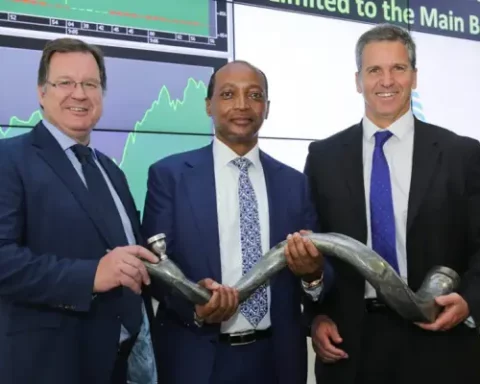The JSE tends to flatter to deceive. We keep thinking now is the time, as JSE stocks have shown us in the past … on occasion. “This market is so cheap!” you will hear, time and again. But the appearance often ensnares us and then we live to regret our patriotism. And yet, the JSE is cheap, and it did have a very solid 2024. So why should 2025 not be at least as good? South Africa has seemingly put load-shedding behind us and surprisingly managed to develop a somewhat functional government against the odds, interest rates are coming down, and there is the whiff of M&A in the air, and the economy is stronger. This might be the year. Please.
Sasol (SOL:JSE)
This was going to be my wild card, given the trials and tribulations fuels and chemicals giant Sasol has endured – and still faces. Yet, the market consensus from six analyst estimates captured by Barron’s rates Sasol as “overweight” – essentially a “buy”.
The numbers paint a grim picture: Sasol’s share price plunged 55% in 2024, making it one of the worst performers on the JSE. It now hovers at the same level as mid-2020. That said, the stock looks remarkably cheap, currently trading at a p:e of 4.9 – well below Omnia and AECI.
In August, Sasol reported a loss for the year ending June – its first in four years. This prompted a revision of its dividend policy to factor in debt levels, resulting in no final payout. CEO Simon Baloyi, who took the helm in April, announced plans to review underperforming assets following massive impairments on both its US and South African operations. Selling some assets could help alleviate its debt burden, which is now (again) a top priority for management.
There are plenty of headwinds: the oil price is expected to weaken, with JPMorgan forecasting Brent crude to average $75 a barrel in 2025, dropping to $60 by year-end.
As for the chemical industry, Deloitte projects moderate growth in global chemicals this year, with margins reverting to “average levels” after a steep decline in 2022. Fitch on the other hand sees margins under pressure from oversupply, uncertainty over China’s economy, geopolitical tensions, and the risk of protectionist US trade policies.
Sasol is the stock to hate. As South Africa’s second-largest emitter of greenhouse gases, it’s an environmentalist’s nightmare.
So why buy it? If there is one area Sasol doesn’t fall short, it’s shareholder upsets. Mine is a gamble on price movements and the hope that those analysts are making the right calls. Sometimes, heading in when everyone else is heading out pays off. – Vernon Wessels
Naspers and Prosus (NPN:JSE)
It is desperately uncreative to nominate Naspers as a stock pick for 2025. But, sadly, Naspers and its sidekick Prosus (of which it owns 56.9%) tick pretty much all the boxes for an era in which technology and scale are likely to predominate.
It is one of the largest technology investors in the world, it has an e-commerce business that has recently turned profitable and it has the mother of all backstops in Tencent, China’s largest game operator and owner of its largest social media service, WeChat. More than 2-billion people interact with its companies.
In December, when Naspers announced its results for the six months to September, new CEO Fabricio Bloisi spoke of how he planned to double Prosus’s value by 2028, adding $100bn. “Philosophically, we’re very focused on value creation,” said Bloisi.
A large part of that plan rests on reducing the discount between Naspers’s share price, and the actual value of its Tencent stock, but also by wringing better (and more profitable) performance from its food delivery businesses like iFood and Delivery Hero, its classified arm OLX, as well as its payments businesses like PayU. Should one of its fintech businesses really take flight, that would no doubt be an added bonus.
Anchor Capital’s highly rated analyst Mike Gresty picked Naspers as one of his stock picks for this year, arguing that Bloisi has brought “a greater sharing of best practices and a harder-edged focus on the turnaround of underperforming businesses”.
Combine that with much brighter prospects for its e-commerce businesses, and the likelihood that European investors will begin to notice what is happening with Prosus, and you can see why the smart money is on Bloisi’s company. The eight analysts who cover Naspers expect it to rise 42% over the next year, while the 17 analysts who cover Prosus are targeting a 28.5% rise in its price in Europe. – Rob Rose
RMB Holdings (RMH:JSE)
For some investors time is money. That near-obsession with time, above all else, apparently played a key role in the decision by RMB Holdings (RMH) to take a R500m hit on the sale of one of its major property assets back in 2022. Or at least that’s what RMH management told shareholders shortly after the sale of Atterbury Europe.
The extremely generous executive incentive scheme also encouraged a speedy sale at any price.
In 2020 RMH executives had put a four- to five-year timeline on the disposal of all the assets of this once-powerful investment company, which had boasted a controlling stake in FirstRand Bank.
Now, RMH is down to a 40c-a-share asset rump. So, you’d think the final hurrah would be just weeks away. But, no. There’s now a chance the executives will struggle to make the end-2025 deadline.
Last December two activist shareholders, Albie Cilliers and Rozendal Worldwide Flexible Prescient Qualified Investor Hedge Fund, bought 11.5% and 5.24% of RMH. They’ve separately indicated they won’t be in too much of a rush to get a return on their investment and are instead looking for value.
Executives fuelled by a time-sensitive incentive scheme won’t be happy. Any of them who were listening in to the results presentation in early December will be particularly unnerved by Cilliers’s apparent in-depth understanding of the potential value of the remaining assets.
Investors who bought the shares for a short-term bounce will also be unhappy. But minority shareholders who’ve been long-term investors should be very happy. Cilliers and Rozendal will use their new share muscle to ensure there are no more questionable asset fire sales.
This means the year ahead should be a rewarding one for shareholders who’ve held on despite management’s dismal performance. And for those watching from the sidelines, it’s likely to be an interesting one. – Ann Crotty
Sygnia 4th Industrial Revolution Actively Managed ETF
Elon Musk’s Tesla, Apple, Nvidia, Alphabet and Amazon might be your go-to topics of convo at every braai right now, but they’re also five of the top 10 holdings in Sygnia’s 4th Industrial Revolution Actively Managed ETF, which I have just invested some shekels into.
Other shares in the mix include Microsoft, Taiwan Semiconductor, Broadcom and Meta. As you’ll gather, the fund’s portfolio managers Iain Anderson and Wessel Brand have an obvious aim in mind: to provide exposure to new global technology and innovation stocks.
It’s an easy way for South African investors to get exposure to the companies shaping our future, with very little effort. Over the past year, its stock rose 18.6%, and it’s up 88% over the past five years.
It’s not for the faint-hearted – the swings of outrageous fortune over the past decade (Covid, post-Covid, AI, Donald Trump) have been mirrored by swings of outrageous proportions in the fund’s share price. But if AI and tech is the big trend you daren’t miss, it’s a good place to start. – Sarah Buitendach
Reunert (RLO:JSE)
It’s not the most inspired stock pick given that I own Reunert shares and have done for the past two years, but I think this is a company with solid foundations and good prospects, and the ability to take advantage of changes in its fields of electrical engineering, ICT and applied electronics.
Reunert was the pivot story of 2021/22 towards renewable energy products in the dark days of load-shedding, and while battery storage now isn’t the same game any more, given a flood of competitors, the company is going to be a key player in electricity trading, given that it secured an electricity trading license in October – one of only six to date.
That means it will be able to sign power purchase agreements between independent power producers and corporate customers to wheel electricity over the Eskom grid.
The caveat is that the revenue stream from this is only likely to kick in in 18 months. The establishment of an independent transmission system operator to expand the grid will also see about 14,000km of new transmission lines installed in the next few years – and that feeds directly into Reunert’s power cable business.
That’s probably also a longer-term play. As for its applied electronics division, the global arms race is surely going to pick up with Trump in power – think of all those Nato members who’ve dragged their heels on defence spending no longer getting away with it – which may well feed into Reunert’s radar and logistics systems, which already have strong order books this year and next.
Results for the year ended September showed an 8% rise in net profit, to R1.04bn, and a 10% increase in the dividend, to 366c a share. Revenues were 5% higher, at R14.4bn. – Giulietta Talevi
Resilient Reit (RES:JSE)
Resilient Reit had a solid 2024, bouncing back after the Covid craziness, as always seemed likely. The company ended the year about 30% up. So why would it have another good year? Two reasons.
First, as a large property company, Resilient is positioned well to take advantage of interest rate declines which seem likely this year. In fact, as a retail-focused real estate investment trust, the company potentially could look forward to a bit of a double whammy because retailers are likely to have a good year for the same reason as the economy picks up a bit. That sets it apart a bit from its old competitor Redefine, which has a much broader property portfolio.
Second, as a value proposition, Resilient is looking strong: the dividend yield is over 7%, and with a p:e of 4.9 times, it’s pretty cheap. What is more, the company reported rental escalation of 6.24% in its most recent interim period. Rentals going up! That will warm the hearts of property investors after years of below-inflation growth.
Resilient is a defensive stock; malls are an overtraded entity in South Africa as we all know. But the end of load-shedding, better politics with the government of national unity and a stronger economy could make this defensive stock look more like the great growth stock it once was. Other property stocks look good too, for the same reasons, but Resilient is just a little less well loved, so the upside potential is more pronounced. – Tim Cohen.
ALSO READ: It’s a wild world: International stocks Currency staffers suggest you examine for 2025
ALSO READ: Go long crocodile skins: Wild investments from the Currency team for 2025
Sign up to Currency’s weekly newsletters to receive your own bulletin of weekday news and weekend treats. Register here.









